Are Hybrid Apps Causing a Bit of a Flutter?
Are PWA going to dethrone Native and Hybrid Apps?
Are Progressive Web Apps (PWA) going to dethrone Native and Hybrid Apps? This is a question that has been on the minds of many app developers and Bradford businesses lately. Let’s take a look at the pros and cons of PWAs to find out.

Pros of PWAs:
1. They are fast and reliable – PWAs load quickly, even on slow connections, and they work well even in areas with spotty or no internet coverage.
2. They are easy to use – PWAs are easy to install and use, as they don’t require an app store download or updates.
3. They are cost effective – Unlike native or hybrid apps, PWAs don’t require a lot of investment to develop and deploy.
4. They are discoverable – Since PWAs can be indexed by search engines, they are easy for users to find online.
5. They are sharable – Users can easily share PWAs with others via URL, making them more viral than native or hybrid apps.
Cons of PWAs:
1. They are not yet supported on all platforms – While PWAs work great on Android, they are not yet supported on iOS devices.
2. They lack some features of native apps – Some features, such as push notifications and access to certain device hardware, are not yet available in PWAs.
3. They have limited offline capabilities – PWAs can work offline, but their offline capabilities are still somewhat limited.
4. They are not as well known as native or hybrid apps – Since PWAs are relatively new, they are not yet as well known or widely used as native or hybrid apps.
So, what do you think? Are PWAs the future of app development? Or will they coexist with native and hybrid apps? Only time will tell. But one thing is for sure – PWAs are definitely worth considering if you’re looking to develop an app around Bradford. Thanks for reading!
Why should I choose Flutter for hybrid app development?
There are many reasons to choose Flutter for hybrid app development. First and foremost, Flutter provides a single codebase that can be used to build apps for both iOS and Android platforms. This means that developers only need to write one set of code, which can then be used to generate binaries for both platforms.
In addition, Flutter also gives developers access to a wide variety of features and libraries that can be used to create rich and interactive apps. For example, Flutter’s Material Design widgets provide support for animation and gestural feedback, while its Cupertino widgets offer a native-looking feel for iOS apps.
Finally, Flutter is an open source project developed by Google, which means that it is constantly being improved and updated. This means that developers around Yorkshire can rely on Flutter to stay up-to-date with the latest iOS and Android platform features. If you’d like to know more contact Bradford Apps for more info.
